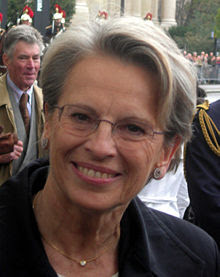Facing her was the channel's Maria Bartiromo, a journalist with a proven track record, author of several books and recipient of various awards.
 |
| Christine Lagarde and Maria Bartiromo (screenshot montage from CNBC video) |
The main thrust of what Lagarde had to say was that "austerity upon austerity doesn't work," with Bartiromo pushing to find out whether Greece would be offered a better deal.
So the scene is set for an interview between two very capable women with Bartiromo quizzing Lagarde on the world global economy (of all things) just ahead of the the annual meetings of the IMF and the World Bank Group in Tokyo.
But remember this was television - a medium in which some journalists, even the most experienced and accomplished can fall into the trap of considering themselves to be at least equal if not sometimes better than the person they're interviewing - or at least giving the appearance of what they have to say and their take on an issue, matters.
You know the sort of thing: a journalist specialising in a certain field becomes the expert qualified to share with viewers, listeners or readers, their point of view.
"Hello subjectivity" and "Goodbye objectivity".
Although there are several examples earlier on in the interview of Bartiromo chipping in with her comments on what Lagarde is saying, take a listen to the exchange that takes place between the two when France is mentioned (fast forward to eight minutes and 57 seconds in the accompanying video - you can watch it here).
Lagarde of course is French and before taking over from Dominique Strauss-Kahn (yes the job has become something of a Gallic domain in recent years) she was this country's finance minister.
Bartiromo wanted to find out (really?) Lagarde's thoughts on the 75 per cent tax rate the French government is planning to impose on those earning more than €1 million annually, asking whether she found it "appropriate".
Ever the international diplomat that she has become, Lagarde was not to be drawn saying she was going to take questions on France for obvious reasons.
"Because it's your country?" asked Bartiromo.
"Correct," replied Lagarde.
But that wasn't enough for the journalist who wanted an answer to the question she had "posed", even if now forced, in part, to give it herself.
"It does seem a little aggressive from a policy standpoint," began Bartiromo.
"Do you think we could see that kind of tax rates in other countries? I mean, this is a real debate. I understand you don't want to criticise or comment on something going on in France. But you have to be thinking about this," she finished, allowing Lagarde a little more room for manœuvre without having to appear to comment openly on internal French politics.
A clever rephrasing of the question from Bartiromo to try to tease out an opinion or a point of view that might otherwise be buried under a blanket of diplomatic doublespeak?
Or a clumsy technique of appearing to the devil's advocate but perhaps letting slip her own thoughts on the subject?
You decide.
Either way, for such a normally dry subject, it's a delicious TV moment as both women retain their poise during what could have been an instant of dead air silence.







